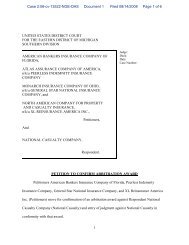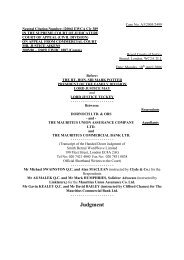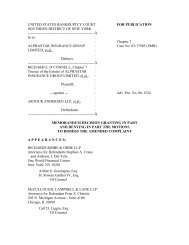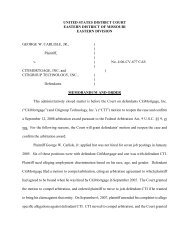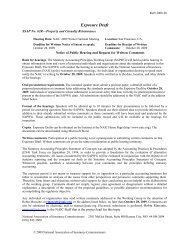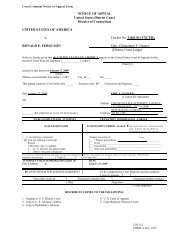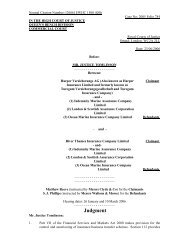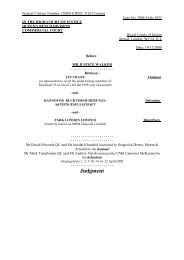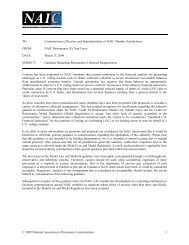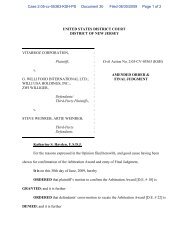Judgment - Reinsurance Focus
Judgment - Reinsurance Focus
Judgment - Reinsurance Focus
Create successful ePaper yourself
Turn your PDF publications into a flip-book with our unique Google optimized e-Paper software.
41.<br />
Mr. Flaux submitted that as owner of the vessel CPL sustained loss at the very moment the<br />
flooding occurred and was therefore entitled to recover a full indemnity in its own<br />
right. In my view that is correct as far as it goes. A contract of insurance is one of<br />
indemnity and the insurers therefore became liable as soon as the damage occurred:<br />
see Firma C-Trade S.A. v Newcastle Protection and Indemnity Association (The<br />
Fanti) and Socony Mobil Oil Co. Inc. v West of England Ship Owners Mutual<br />
Insurance Association (The Padre Island) (No.2) [1990] 2 Lloyd's Rep. 191, 202,<br />
col.1 per Lord Goff. However, in accordance with the ordinary principles of<br />
subrogation the insurers are entitled to the benefit of any rights held or benefits<br />
received by the insured which diminish the ultimate loss: see Castellain v Preston<br />
(1883) 11 Q.B.D. 380 per Brett L.J. at pages 388-389 and Cotton L.J. at pages 393-<br />
394.<br />
42.<br />
Mr. Flaux submitted that the fact that the damage was subsequently made good by<br />
Sembawang at its own expense was not something of which the insurers could take<br />
advantage in this case and so did not prevent CPL from incurring a loss. He relied on<br />
a number of authorities beginning with the following passage in the judgment of<br />
Bowen L.J. in Castellain v Preston at page 404:<br />
“Suppose that a man who has insured his house has it damaged<br />
by fire, and suppose that his brother offers to give him a sum of<br />
money to assist him. The effect on the position of the<br />
underwriters will depend on the real character of the<br />
transaction. Did the brother mean to give the money for the<br />
benefit of the insurers as well as for the benefit of the assured?<br />
If he did, the insurers, it seems to me, are entitled to the benefit,<br />
but if he did not, but only gave it for the benefit of the assured,<br />
and not for the benefit of the underwriters, then the gift was not<br />
given to reduce the loss, and it falls within Burnand v.<br />
Rodocanachi.”<br />
43.<br />
Burnand v Rodocanachi (1882) 7 App. Cas. 333 concerned a claim by underwriters to<br />
recover from the owners of a vessel destroyed by a Confederate cruiser on which they<br />
had paid a total loss under a valued policy a sum received from the United States by<br />
way of compensation for the difference between their actual loss and the amount<br />
received under the policy. The House of Lords rejected the claim on the grounds that<br />
the payment in question was not made with a view to reducing the loss against which<br />
the underwriters had agreed to indemnify the insured. In Castellain v Preston Bowen<br />
L.J. himself provided an explanation for that decision when he said<br />
“I think the root of the decision in Burnand v. Rodocanachi<br />
was that the payment which had been made did not reduce the<br />
loss, not having been intended to do so. The truth was that the<br />
English Government and the American Government agreed that<br />
the sums which were to be paid were to be paid not in respect<br />
of the loss, but in respect of something else, and therefore the<br />
payment could not be a reduction of the loss.”


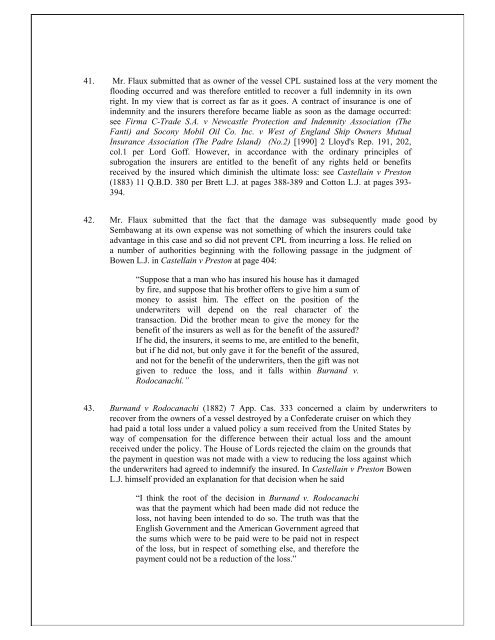
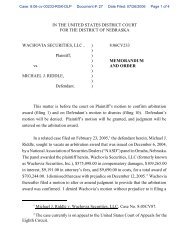
![202 Folio No 734 Neutral Citation Number: [2006] EWHC 1345 (QB ...](https://img.yumpu.com/50015000/1/184x260/202-folio-no-734-neutral-citation-number-2006-ewhc-1345-qb-.jpg?quality=85)
